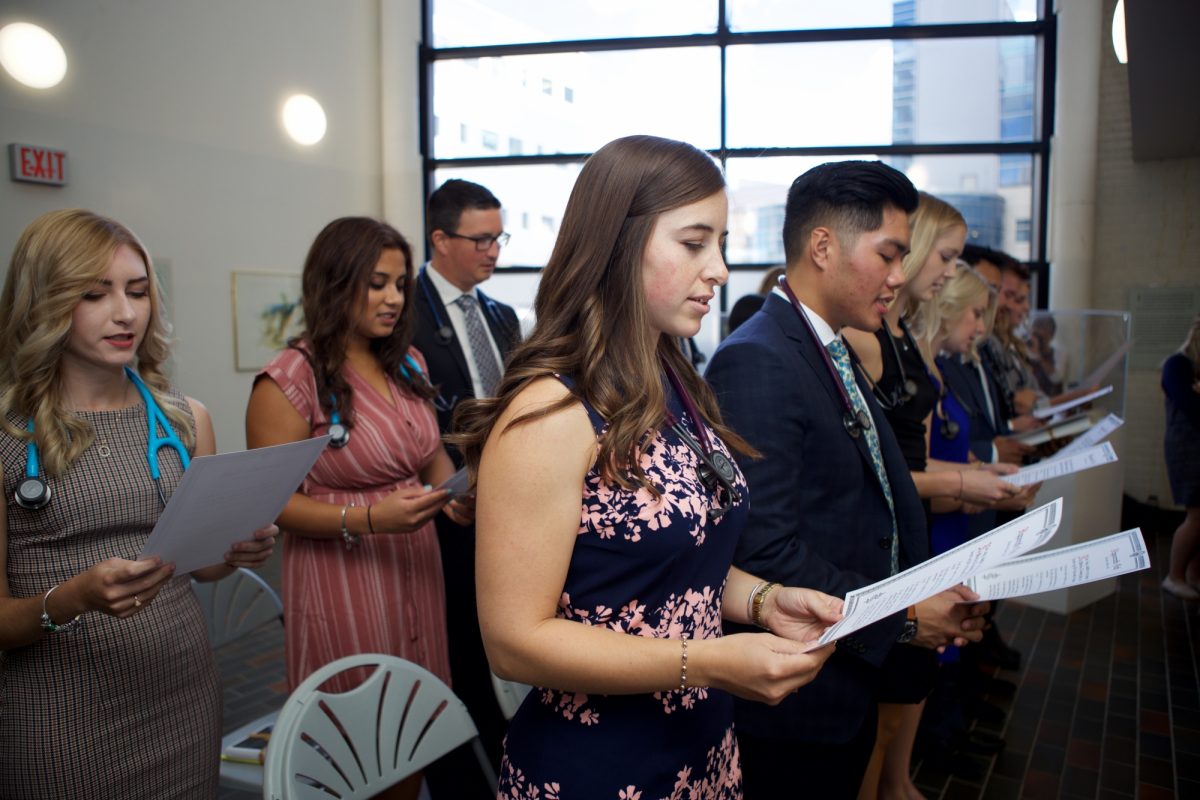
Students entering the Master of Physician Assistant Studies program recite the Hippocratic Oath.
Physician Assistant program welcomes new class, celebrates profession with stethoscope ceremony
The 12th class of the University of Manitoba Master of Physician Assistant Studies (MPAS) program was welcomed at inaugural exercises on August 30, 2019.
After opening remarks and greetings from the U of M, Rady Faculty of Health Sciences, Shared Health and the College of Physicians and Surgeons of Manitoba, the students took part in a meaningful stethoscope ceremony and recited the Hippocratic Oath.
Physician assistants (PAs) are medically-educated clinicians who work as medical providers in collaboration with physicians. They perform duties such as medically assessing patients, ordering and interpreting diagnostic tests, performing procedures and prescribing medications.
The program is the only one in Canada to train physician assistants at the graduate level. This year, there were 153 applicants for 15 spots. The Class of 2021 consists of 10 Manitobans, two from Alberta, and three from Ontario.
A rich diversity of students make up the class including immigrant, Indigenous, rural- and urban-raised individuals. Members of the class hold degrees in fields such as pharmacy, psychology, biochemistry, immunology, kinesiology, occupational therapy and biomedical sciences.
In his remarks, Dr. Brian Postl, dean, Rady Faculty of Health Sciences, said this profession was “an example of what we need to do more of in health care,” which reflects the health sector’s evolving focus on inter-professional team models of care and collaboration.
Since launching in 2008, the program has graduated 122 PAs. Of the program graduates working in Manitoba, 45 are employed in surgery, 20 work in internal medicine/hospitalist roles, 19 in primary care, 15 work in emergency/urgent care, eight in mental health, one in obstetrics and one in addictions.
Twenty-three per cent of graduates work in rural communities. There are also graduates practicing in Alberta, Ontario, New Brunswick and the Northwest Territories.
University of Manitoba President and Vice-Provost Dr. David Barnard highlighted the students’ wealth of volunteer experience with various charitable organizations, student mentorship, sports teams, and cultural and recreational groups.
“It’s these types of diverse interactions that will define the kind of physician assistant you will become. You have, in one way or another, improved the quality of life for the people you’ve worked with and you did so with compassion and integrity; the core values of the health professions,” he said.
Students from the Class of 2021 shared some thoughts about their future profession with us:
What attracted you to the physician’s assistant program?
“I always wanted to work in health care. I wasn’t sure which route to go in when I was doing my B.Sc. degree, and then I heard about the PA profession. I was intrigued because PAs have a unique ability to be flexible and versatile in the health-care system. They’re trained as medical generalists so they have the ability to work anywhere in health care which is cool to me because I’m from a rural community and I’ve seen first-hand the impact that a PA can make. I wanted to become a PA so I can one day help my patients and reduce wait times and the other issues we have in rural medicine.” – Shelby Page
What are you most looking forward to?
“I would consider myself a people’s person. Going back to my year-and-a-half in the Emergency Medical Service, I realized my passion for helping, mentoring, advocating for patients and that’s something I’m eagerly looking forward to.” – Sem Moreno
Is there a specific area of health care you want to specialize in?
“Personally I have a lot of experience with different specific health-care specialties. I’m interested in general medicine, emergency medicine and maybe [have] an inkling toward cardiology. I think I’ll really get to know what I want to do when I’m in the clinic and on the rotations. I have an open mind. As I go through I feel like I’ll have a calling towards something specifically.” – Avery Clavio






